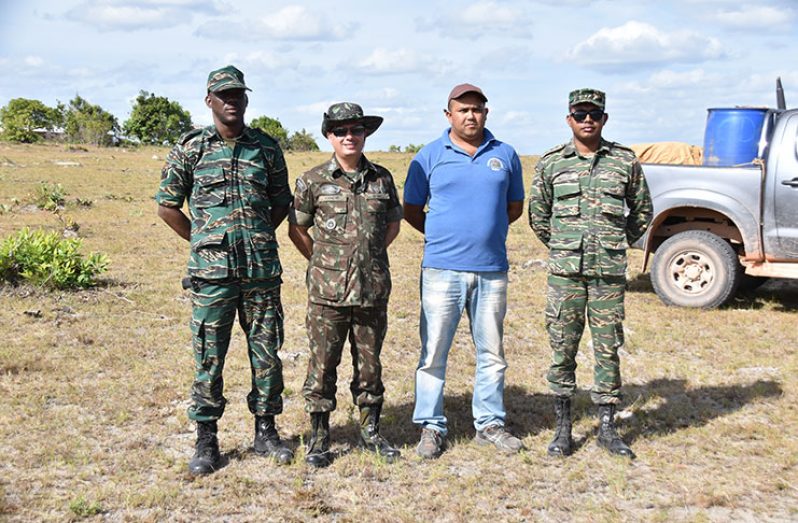GUYANA in collaboration with Brazil through their respective armies are preparing to wrap up a 10-day reconnaissance mission in Region Nine, which will pave the way for the drilling of eight wells in eight villages in October of this year.
On Sunday, Commanding Officer of the 6th Construction Engineering Battalion of the Brazilian Army, Lieutenant Colonel Vandir Pereira Soares Junior and Director General of the Civil Defence Commission (CDC), Lieutenant-Colonel Kester Craig, wrapped up a three-day visit to the identified locations of the wells.
The wells are intended to ensure water supply through cyclical dry seasons.
During the drilling phase, the Brazilian army will be working closely with the Guyana Defence Force (GDF) and this collaboration will see the drilling of artesian wells in the villages of Aishalton, Chukrikednau, Shea, Maruranawa, Awarawaunau, Karaudarnau, Achiwib and Bashraidrun.
The reconnaissance mission commenced on March 19 and will run until March 29, 2018. Already, on-the-ground testing has been completed for more than half of the communities identified.
During the three-day visit to the communities, Colonel Vandir Soares and his team along with the team from the CDC were able to visit the proposed locations and to meet with some of the village leaders and residents to identify any potential challenges with regard to access to the communities, particularly the remote villages.
In an invited comment, Colonel Craig said that the drilling of wells is an important part of disaster response and preparedness, particularly during the El Nino season. Importantly too, Guyana is benefitting from the transfer of knowledge and technology with the beneficiaries being the main stakeholders, the Guyana Water Incorporated (GWI) and the GDF.
“The well-driving operation is a comprehensive disaster risk management approach to reduce the identified communities risk to the impact of drought. These wells, which are being drilled to approximately 100 metres and the best identified locations would seek ensure that the communities have potable water during prolonged dry seasons and drought conditions,” Colonel Craig explained.
KNOWLEDGE TRANSFER
Further, the operation would seek to build the country’s well-drilling capacity and ensure that valuable knowledge is transferred to the national and local players, which is key for sustainability and drilling of other wells not only in Region Nine, but in other vulnerable communities in Regions One, Two, Seven and Eight.
In an effort to stay within the stipulated 60-day project duration, the Brazilians will be bringing three drilling machines and two teams from both armed forces will be dispatched to work in conjunction.
Raymond Almando, Toshao of Bashraidrun, a border community with a population of 142, in an invited comment said that the wells will bring significant relief to residents of the communities identified.
Given its remote location, Almando said that he is pleased that the community has been included in the project.
“I say when this opens, everyone will be happy because we will get water. We will get water for our gardens and our children. We punish when there is no water. I am happy that this government is working for this community. We are not lost. We are getting this. Everyone is happy to get water because it will be centrally located, especially for the health post and the school,” he noted.
WELCOMED INITIATIVE
Leonard Johnson, Toshao of Achiwib, a titled indigenous community with a population of 616, echoed those sentiments, noting that with the dry season beginning to approach, it is a welcomed initiative for the community.
“Well we are very happy that we will be getting this well. With the well-being centralised, people can come on their carts and get water to take back to their homes, because this dry season is very hard for us, so we want to say thank you to the government and we will lend our support where necessary,” he said.
This project follows President David Granger’s state visit to Brazil in December 2017, when the Complementary Agreement to the Basic Agreement on Technical Cooperation between the Government of the Republic of Guyana and the Federative Republic of Brazil for the Implementation of the Project Technologies to Reduce the Effects of the Drought in Region Nine of Guyana, was inked.
The Complementary Agreement states that the Government of Brazil shall undertake to “promote the transfer of Brazilian knowledge and experience related to mitigation of the effects of drought; provide the means for implementation of activities foreseen in the project, send consultants and experts to implement activities to be carried out in Guyana, support the development of the Guyanese technical team’s capacity to drill artesian wells and monitor and evaluate Project implementation.”
Meanwhile, the Government of Guyana, as prescribed in the Agreement, shall “take responsibility for the maintenance of the artesian wells that will be drilled during the practical operations on the ground; appoint a technical team to monitor and participate in activities to be implemented, provide the technical team sent by the Government of Federative Republic of Brazil with the logistical support required to implement activities of their responsibility and to take measures to ensure that activities implemented by professionals sent by the Brazilian Government will be continued by professionals from the Guyanese implementing institution.”




.png)









